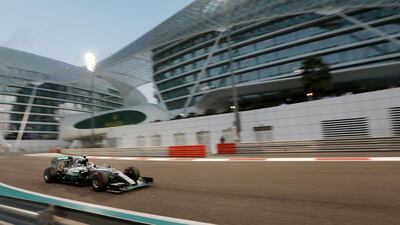Of all the events on the winter calendar in Abu Dhabi, the annual Formula One race is one of the most keenly anticipated. The race itself is a sell-out and on Sunday evening, when one of Nico Rosberg or Lewis Hamilton will be crowned world champion, the stands will be swelled with spectators from around the world.
Yas Marina Circuit has staged the event since 2009, which was F1’s first day-night race, but the real effect of the grand prix is evident long after the cars have pulled into the pit lane and the drivers have left the country to enjoy their well-earned winter break.
F1is one of the most popular sports around the world and, as such, the race is a critical part of the city’s tourism pitch. On the ground, the race brings in millions of dollars in revenue spread across the hospitality and entertainment sectors for the days before and after the event. Broadcast around the world, the race also showcases the many existing and developing attractions of Abu Dhabi and the UAE in general to a global television audience.
As a technology-heavy sport, F1 has the potential to become an important driver of the knowledge-based economy. Many of the technical developments first found in F1 cars may eventually filter their way down into the cars we will drive tomorrow. Some of the data the teams collect this weekend as the racing cars toil in the afternoon heat may inform car makers’ manufacturing decisions and development in years to come.
While the sport’s technical hub has traditionally been Britain (although Ferrari, in particular, may argue otherwise), there is hope in the longer term that the UAE could play host to F1 teams for parts of the winter break, for young Emirati drivers to eventually make their way onto the starting grid and for scientists and engineers from this region to find their way into the support crews. If any of those scenarios happens, the industries that surround F1 would undoubtedly have to increase their footing in the Gulf. All of that, however, is for tomorrow.
Over the past seven years, Yas Island has become one of the most sought-after locations in the city, complete with world-class shopping facilities, hotels, concert venues, new residential developments and theme parks (with more on the way). Yas Island’s development as a tourist destination has been anchored by the presence of the circuit, but its importance can be heard even when the track is silent.
For residents of the city, Grand Prix weekend falls within some of the busiest months of the calendar. Last weekend, it was Abu Dhabi Art, while next weekend marks the start of the month-long Sheikh Zayed Heritage Festival and National Day celebrations. The weather is ideal, there is a buzz about town and events are popping up everywhere.
Enjoy the race, marvel at the spectacle and stop for one moment to remember that before F1, Yas Island was little more than a dusty outpost on the fringes of the city. A reminder, perhaps, that change in this country is often delivered at speeds that would embarrass even the quickest F1 drivers.

